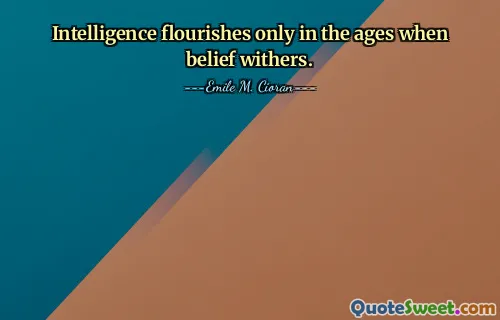Emil M. Cioran was a Romanian philosopher and essayist, known for his profound and often pessimistic insights on existence and the human condition. His writings explore themes of despair, nihilism, and the absurdity of life, often reflecting on the futility of human endeavors. Cioran’s unique perspective is marked by a style that combines both lyrical beauty and stark existential thought, influencing many readers and thinkers. Born in 1911, Cioran's early life in Romania laid the foundation for his later philosophical inquiries. He moved to France in the late 1930s, where he wrote primarily in French. His works reveal a deep skepticism towards traditional values and beliefs, encouraging a critical examination of life’s meaning, questioning religion, and challenging societal norms. Cioran’s thoughts resonate with elements of existentialism and mysticism, often pushing the boundaries of pessimism. Despite his bleak outlook, Cioran's writing is praised for its elegance and depth. He believed that acknowledging the absurdity of life could lead to a form of liberation. His works continue to inspire readers to confront the darker aspects of existence and to embrace the complexities of human nature. Overall, Cioran's legacy is that of a thinker who bravely confronted the shadows of life, urging others to understand and accept their place in a chaotic world.
Emile M. Cioran was a Romanian philosopher and essayist deeply influential in existential thought.
His writing is known for its poetic style and a poignant exploration of despair and the human condition.
While often pessimistic, Cioran’s work encourages a profound engagement with life’s inherent absurdities.
もっと見る »
Today Birthdays
1887 -
Robinson Jeffers
1864 -
George Washington Carver
1936 -
Stephen Ambrose
1953 -
Pat Benatar
1949 -
George Foreman
1945 -
Rod Stewart
1936 -
Robert Woodrow Wilson
1938 -
Donald Knuth
1974 -
Hrithik Roshan
1956 -
Antonio Munoz Molina
1980 -
Sarah Shahi
1936 -
Al Goldstein
1939 -
David Horowitz
1955 -
Michael Schenker
1986 -
Abbey Clancy
1959 -
Chris Van Hollen
1989 -
Emily Meade
もっと見る »
